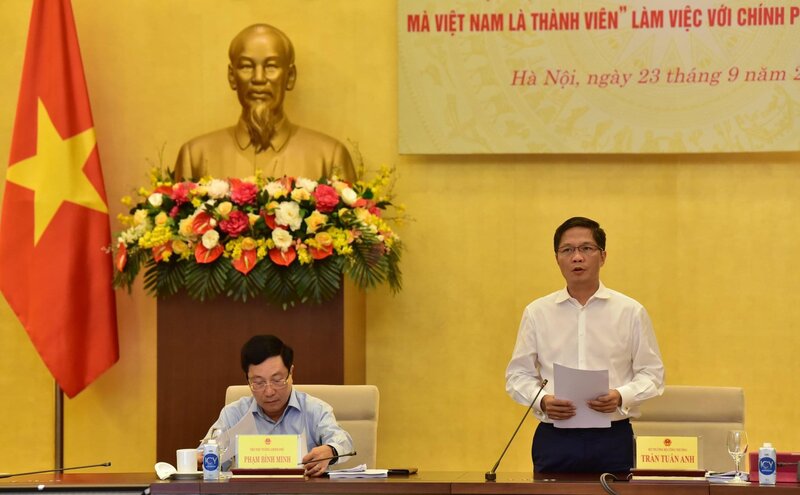Vietnam trade minister highlights preliminary successes from EVFTA, CPTPP
In addition to higher trade turnover, the implementation of the two new-generation and high-standard deals is pushing Vietnam to revise its legal framework to ensure compatibility.
Minister of Industry and Trade Tran Tuan Anh has pointed out preliminary successes from Vietnam’s latest free trade agreements including the Comprehensive and Progressive Agreement for Trans – Pacific Partnership (CPTPP) and the EU – Vietnam Free Trade Agreement (EVFTA).
| Minister of Industry and Trade Tran Tuan Anh at the meeting. Photo: VGP. |
Nearly one month after the CPTPP took effect on December 30, 2018, Prime Minister Nguyen Xuan Phuc approved a plan to implement the deal with specific steps.
To date, the government has issued 15 legal documents related to the CPTPP and is still reviewing existing legislation to ensure its compatibility with the deal.
Minister Anh informed in 2019, trade turnover between Vietnam and 10 CPTPP member countries increased 3.9% year-on-year to US$77.4 billion. Of the amount, Vietnam’s exports to the CPTPP partners rose 7.2% year-on-year to US$39.5 billion while the country imported US$37.9 billion, an increase of 0.7%.
This resulted in Vietnam’s trade surplus with countries in the CPTPP of US$1.6 billion, a stark contrast from the country’s trade deficit of US$0.9 billion in the previous year, Mr. Anh noted at a meeting on September 23.
With Canada and Mexico, two markets with which Vietnam has not signed bilateral free trade agreement (FTAs), the country posted a trade surplus of over US$5 billion in 2019, or 50% of its overal trade surplus.
Mr. Anh added exports to Canada expanded 29.8% during the period, and those to Mexico rose 26.3%.
However, the trade minister acknowledged Vietnam’s exports to CPTPP members were lower than the expected. Exports turnover to Japan account for 2.8% of the total, the largest share, and to Mexico the lowest with 0.6%.
Meanwhile, Mr. Anh said the implementation of the CPTPP has helped Vietnam improve its legal framework in various fields that range from environment, labor to intellectual property rights.
Meanwhile, the EVFTA has also generated positive results after one month of implementation, Mr. Anh said.
In August 2020, local competent authorities issued over 7,200 sets of EUR.1 certificates of origin (C/O) to eligible Vietnamese products worth US$277 million that would be shipped to 28 EU countries. Goods that have been granted EUR.1 C/O are mainly footwear, seafood, plastic and plastic products, coffee, textiles, bags, suitcases, vegetables, rattan, bamboo, and knitting products, among others.
Minister Anh expected the government would continue to revise current laws and regulations to boost the EVFTA’s efficiency in the coming time.













